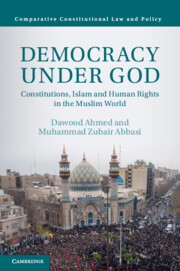Book contents
- Democracy Under God
- Comparative Constitutional Law and Policy
- Democracy Under God
- Copyright page
- Brief Contents
- Detailed Contents
- Figures
- Tables
- Preface
- Acknowledgments
- Note on Translation, Transliteration, and Citations
- Introduction
- Part I
- Part II
- Part III
- 5 Islamic Supremacy Clauses and Rights
- Conclusion
- Bibliography
- Index
Conclusion
from Part III
Published online by Cambridge University Press: 23 February 2023
- Democracy Under God
- Comparative Constitutional Law and Policy
- Democracy Under God
- Copyright page
- Brief Contents
- Detailed Contents
- Figures
- Tables
- Preface
- Acknowledgments
- Note on Translation, Transliteration, and Citations
- Introduction
- Part I
- Part II
- Part III
- 5 Islamic Supremacy Clauses and Rights
- Conclusion
- Bibliography
- Index
Summary
In much of the Muslim world, the idea of incorporating Islam into a constitution seems to be very popular and, in some cases, understood as a panacea for political ills including, but not limited to, corruption and autocracy. It is sometimes assumed that adopting Islam in political life will resolve a range of social, political, and economic problems and therefore democratic demand for the incorporation of Islam during constitution-making moments often appears strong. This is not new: constitution making in the Muslim world since almost a century and a half earlier has sought to grapple with this tension where the adoption of “modern” constitutions must be blended and synchronized with Islamic concepts to remain legitimate and acceptable to the masses – so that the resulting outcome is an “Islamic” constitution.
- Type
- Chapter
- Information
- Democracy under GodConstitutions, Islam and Human Rights in the Muslim World, pp. 185 - 190Publisher: Cambridge University PressPrint publication year: 2023



